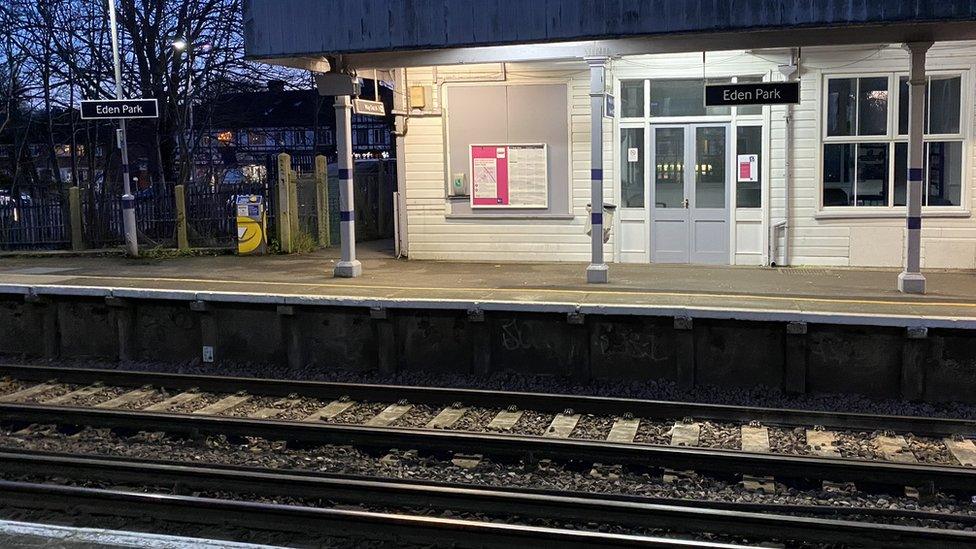Falling from train platforms: 'It was terrifying, the guide dog was screaming'
- Published

Mercer, Artur Ortega's guide dog, was heard "screaming" when he fell from a platform at a train station
After a recent inquest concluded that the lack of tactile paving contributed to the death of a blind man who fell from a rail station platform, how rare is this kind of incident?
"My guide dog hit the rail with his nose and his hip, leaving him screaming on the track," Artur Ortega told the BBC Access All podcast.
"The shock you feel, the dog screaming, realising there's a live wire, the train coming up and everyone on the platform screaming. It was terrifying"
Artur, who is blind, was walking along the platform at New Eltham station, south-east London, to catch a train to London Bridge in 2012 when he and his guide dog, Mercer, fell over the edge of the platform.
"Like every other commuter morning, I walked parallel to the platform edge, my guide dog on the left-hand side, the tracks on the right-hand side. I didn't realise how close I was to the platform edge because there was no tactile paving.
"Suddenly, I slipped."
Artur, a software architect, says bystanders quickly pulled him and Mercer to safety while rail staff called ahead to stop the incoming train. After a few weeks of recovery, both returned to work and commuting.
Cleveland Gervais was not so lucky.
"Cleveland brought it all back," Artur says. "When I first read about Cleveland's death I thought 'this could have been me'."
Cleveland had lived in Lambeth, south London, for 30 years when he was heading home one February evening in 2020.

Cleveland Gervais died after falling off the edge of a London railway platform
The HIV charity counsellor had no vision in one eye and 6% in the other and used a white walking stick, instead of a cane, to navigate. He had always felt confident using the rail network.
But as the 53-year-old walked along the platform at Eden Park station, Beckenham, he had no idea how close to the edge he was because there was no tactile paving indicating his position.
As a train rumbled towards the station, Cleveland fell.
An inquest at South London Coroner's Court earlier this month concluded Cleveland's death was an "accident," but a lack of tactile paving contributed "more than minimally" to his death.
Although these sound like harrowing, rare incidents, falls from platforms due to a lack of tactile paving happen all too often according to the Royal National Institute of Blind People (RNIB).
It says studies have shown that blind or partially sighted people make up 15% of all those who fall from platforms, despite representing only 3.3% of the UK's population, although no specific numbers were provided.
It said it was "aware of several similar occurrences" where the lack of tactile paving may have contributed to people with sight loss falling onto railway tracks.
Currently, 40% of mainline railway stations in England, Scotland and Wales do not have tactile paving - that amounts to about 1,000 stations. The rail network in Northern Ireland has tactile paving on all its platform edges, according to the RNIB.
Cleveland's death happened in the same London region as Artur's fall.
"I'm angry that's it's still happening eight years after me," Artur says. "I'm angry because no one did anything.".
Since 1998 the government has said the implementation of tactile paving should be "considered" in new developments and improvement schemes at stations. Guidance it reiterated, external in 2021.
But currently, it is not a legal requirement to incorporate it.
Artur says: "It is incomprehensible to me that almost a quarter of a century wasn't long enough to install tactile paving.
"It only shows that the rail industry doesn't care enough about the health and safety of disabled passengers."

When speaking to blind rail-users most had a horror story related to falling over the edge of a platform because of a lack of tactile paving.
The BBC's Washington correspondent, Gary O'Donoghue, is no exception, having fallen over the edge three times.
He said the worst occasion was on the London Underground when he didn't realise he was on an island platform with two open edges.
"I got off the Tube, walked a few steps forward to find the wall and fell straight off the other side," he says.
"I had a brief moment worrying where the live rail was, then I worried about trains coming, then I managed to scramble back up."
He says he's "much more careful" when walking along platforms these days.
"It's like a tight rope and you feel like your next step could be into oblivion."
In its 2021 report into Cleveland's death, the Rail Accident Investigation Branch made six recommendations to reduce this risk to blind and visually impaired people.
Two of those, directed at the Department for Transport (DfT) and Network Rail, said they should "seek improvements" to the process of deciding when tactile paving is installed and develop a plan for higher priority locations "in a timely manner".
Allan Spence, from Network Rail offered condolences to Cleveland's family and said: "We have around 5,500 station platforms across Britain, over 60% of which are fitted with tactile strips. We have now secured the extra funding needed to fit them all."
That extra funding is a commitment of £70m by the DfT to complete the national roll-out of tactile paving. It says it is "in the process of agreeing a detailed timetable".
Mr Spence said it would prioritise stations where there was a higher proportion of blind and partially-sighted passengers and where stations had tactile paving on only some platforms.
Roisin Jacklin, the RNIB's policy advisor, says: "We're really pleased that there is the commitment both from DfT and Network Rail to get the network fully tactiled.
"But at the moment, we need the further funding to be released from the transport minister so that Network Rail can ensure the network is fully installed with tactile. We need this delivered as soon as possible."
At Eden Park, tactile paving has now been fitted. It had been scheduled, but not carried out, before Cleveland's death.
Despite the plans it remains too little too late for those who have fallen and injured themselves, and for Cleveland's family who have lost someone they love.
"I'm heartbroken and I'm horrified," was how Sekha Hall, Cleveland's partner of 19 years, summed it up.
You can listen to the podcast and find information and support on the Access All page.

- Published3 May 2022

- Published26 April 2022
